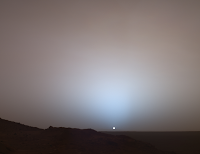Space is not about space. An answer to the question: "What's so interesting about space anyway?"
Saturday, July 31, 2010
There are people that are interested in space, and many that aren't, but what the latter usually fails to understand is that space isn't about space, not space itself. Being interested in space is not about a geeky fascination with this sort of thing:
It's about having your mind blown every time you look up at the night sky and realize that there are entire other worlds out there beyond our own.
 |
| The Sun setting on Mars. |
Space is not about space. The desire to go to space is not the desire to enter a void, to endlessly circle the Earth, to conduct an experiment or two and come back. These preliminary steps are what need to be done, in the same way that athletes train day in and day out, but it is not the end goal. We go to space because there are about 400 billion stars in our galaxy, and another few hundred billion galaxies in the known universe, and we want to know what is there, to see it with our own eyes. We want to stand on the ground and watch a double sunset, to go into direct orbit around a planet circling a dreary red star its inhabitants call home, to find a rogue planet and its moons, thrown out from its solar system of birth early on and alone ever since. Creatures on the ground there may never have actually imagined that life could ever exist anywhere else but a very safe distance away from the immensely hot balls of gas light years away that make up the only light they are used to.
 This is what space is about. It is not about the void of space itself, though it is what we need to cross to reach there. It is not about astrophysics and new methods of propulsion, though that is what we will need to arrive. What drives us is this: when the sky darkens and the stars can now be seen, in spite of the massive distance we are now looking directly at them. Right this minute, you are looking at a pinprick of light, and it's somewhere. Over there is something, something is happening, someone may even be looking back. And for each and every tiny point of light in the sky, the only thing separating it from you is distance, a certain amount of space. Cross that space, and you're there. This realization is what makes us interested in space, not the space itself but what is contained within it.
This is what space is about. It is not about the void of space itself, though it is what we need to cross to reach there. It is not about astrophysics and new methods of propulsion, though that is what we will need to arrive. What drives us is this: when the sky darkens and the stars can now be seen, in spite of the massive distance we are now looking directly at them. Right this minute, you are looking at a pinprick of light, and it's somewhere. Over there is something, something is happening, someone may even be looking back. And for each and every tiny point of light in the sky, the only thing separating it from you is distance, a certain amount of space. Cross that space, and you're there. This realization is what makes us interested in space, not the space itself but what is contained within it.Will the general public ever become as interested in space as the rest of us? I believe they will. Consider for a moment that in spite of all the exploration and astronomy that has been done so far, the total sum of inhabitable locations we have discovered is exactly zero. What happens when within the next few years our isolation finally ends and we know of one, two or a few dozen planets just like our own? What happens when we finally obtain this image?
Can we truly remain uninterested in space once this has happened? I sincerely doubt it.










